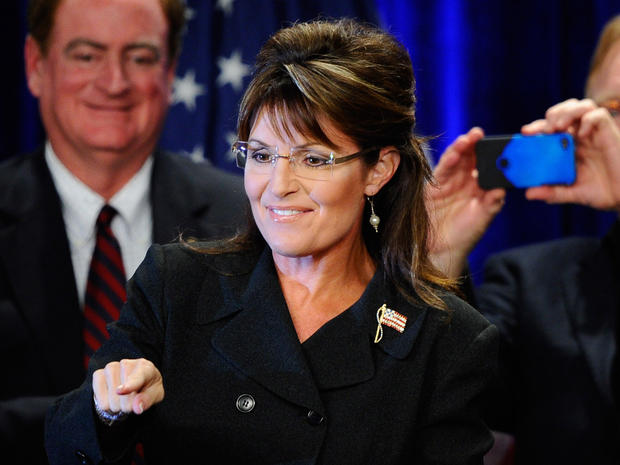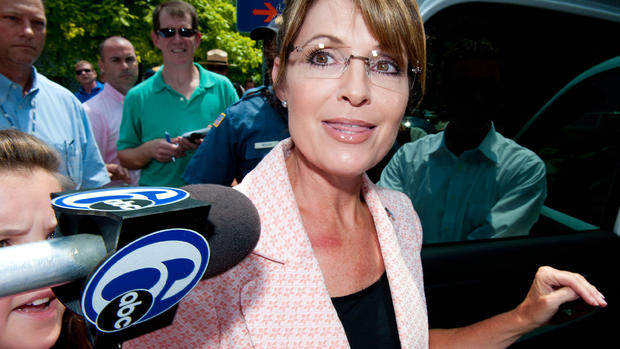Why a Sarah Palin presidential campaign is hopeless
This post originally appeared on Slate.
DES MOINES--Sarah Palin says George Washington is her favorite founder because he was reluctant to serve but answered the call of duty. She likes to think of herself this way, answering the needs of a clamoring electorate. That is part of the cinematic beauty of her bus tour: The crowds that greet her can represent that call to take up their standard and head into presidential battle on their behalf.
There's only one problem: The call isn't coming. That's the clear message in a new CBS News poll of the Republican field. Taken after the Palin bus tour started rolling, it asked Republicans whether Palin should run. By a 20-point margin (54 percent to 34 percent), Republicans said she should not run. Among Tea Party supporters, where Palin has her strongest following, she is also waved off against a run. Half say she should not run; 38 percent say she should.
The biggest challenge to a Palin candidacy has always been that her image within her own party has been getting worse. Some 36 percent of Republican voters have an unfavorable view of her, compared to the 37 percent that have a favorable view. Her favorability rating has declined since April.
CBS News Poll: Most Republicans don't want Palin to run
Why? Some of the reluctance may be that voters don't think Palin is qualified. Almost two of five Republicans say this in a recent Washington Post poll. Interviews suggest some who really like Palin think she'll never get a fair shake from the media, making the presidential race a distracting nightmare. Others cite her poll numbers in the general electorate, where her unfavorable numbers are at toxic heights.
Then there are what we seasoned political reporters like to call "the facts on the ground." I've been in Iowa the last few days, and voters and activists here are in a shuffle-the-cards mode. They cycle through all the candidates, even the ones far back in the polls like Rick Santorum. Gov. Rick Perry of Texas has come up several times, even though he's only rumored to be thinking about considering getting in the race. Herman Cain is getting a lot of buzz. People like that he's not a politician, which means both that he didn't hold a Washington job but also that he's not a polished guy who's always trying to pitch you something.
Video: CBSNews.com interview's Herman Cain
In all my conversations, no one brought up Palin--either as the answer to the presidential puzzle or as a question mark worth waiting for, like Perry.
If Palin wants to campaign in Iowa her time is running out. Gov. Terry Branstad, a Republican, says any candidate who wants to get in has to do so this month or next. Branstad wants a long campaign with a lot of candidates--partly to help build the party, but also because it's good for his state economy. Still, he speaks to a truth everyone in Iowa politics believes: Popularity alone won't get voters to the caucuses in January. George W. Bush waited until June 1999 to make his first visit to the state as a candidate, but he also had an organization already built and in place. "Every Republican candidate will have to run a 99-county campaign," says Branstad. "This isn't like the Democratic race where you can just visit the big cities."
Palin also faces another problem in Iowa. Michele Bachmann, an Iowa native, is challenging her among Tea Party members and movement conservatives. This is Palin's base. And Bachmann's campaign manager, Ed Rollins, says she will "be so much more substantive" than Palin. "People are going to say, 'I gotta make a choice and go with the intelligent woman who's every bit as attractive,' " he says. This isn't coming from the lamestream media or a member of the GOP establishment like Karl Rove: Rollins worked for Mike Huckabee in 2007 and managed the Reagan re-election campaign in 1984. Palin is going to have to compete hard, and the competition might not be delicate.
Sarah Palin has shown a laudable imperviousness to conventional wisdom. Perhaps the grim developments in the face of her latest public bus tour may only spur her interest in running to prove that she can not only show the pundits she's wrong but that she can defy political gravity. Still, if Paul Revere were involved in politics today, he might be ringing those warning bells.
More from Slate:
Why do Democrats moralize about Weiner but not Bill Clinton?
Afghanistan war: Should Obama change the U.S. strategy?
Why are so few high-tech companies based in Europe?


